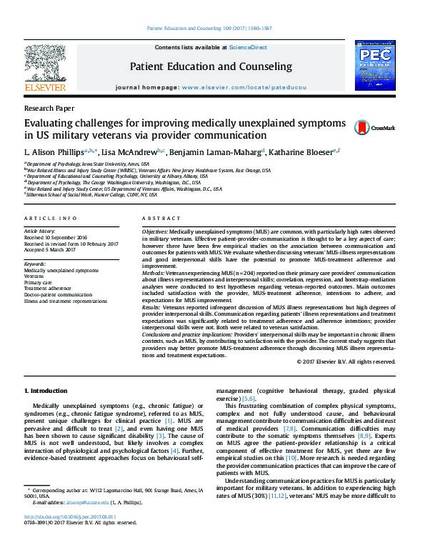
Objectives: Medically unexplained symptoms (MUS) are common, with particularly high rates observed in military veterans. Effective patient-provider-communication is thought to be a key aspect of care; however there have been few empirical studies on the association between communication and outcomes for patients with MUS. We evaluate whether discussing veterans’ MUS-illness representations and good interpersonal skills have the potential to promote MUS-treatment adherence and improvement.
Methods: Veterans experiencing MUS (n = 204) reported on their primary care providers’ communication about illness representations and interpersonal skills; correlation, regression, and bootstrap-mediation analyses were conducted to test hypotheses regarding veteran-reported outcomes. Main outcomes included satisfaction with the provider, MUS-treatment adherence, intentions to adhere, and expectations for MUS improvement.
Results: Veterans reported infrequent discussion of MUS illness representations but high degrees of provider interpersonal skills. Communication regarding patients’ illness representations and treatment expectations was significantly related to treatment adherence and adherence intentions; provider interpersonal skills were not. Both were related to veteran satisfaction.
Conclusions and practice implications: Providers’ interpersonal skills may be important in chronic illness contexts, such as MUS, by contributing to satisfaction with the provider. The current study suggests that providers may better promote MUS-treatment adherence through discussing MUS illness representations and treatment expectations.
Available at: http://works.bepress.com/lalison-phillips/19/

This article is published as Phillips, L. Alison, Lisa McAndrew, Benjamin Laman-Maharg, and Katharine Bloeser. "Evaluating challenges for improving medically unexplained symptoms in US military veterans via provider communication." Patient Education and Counseling 100, no. 8 (2017): 1580-1587. DOI: 10.1016/j.pec.2017.03.011.